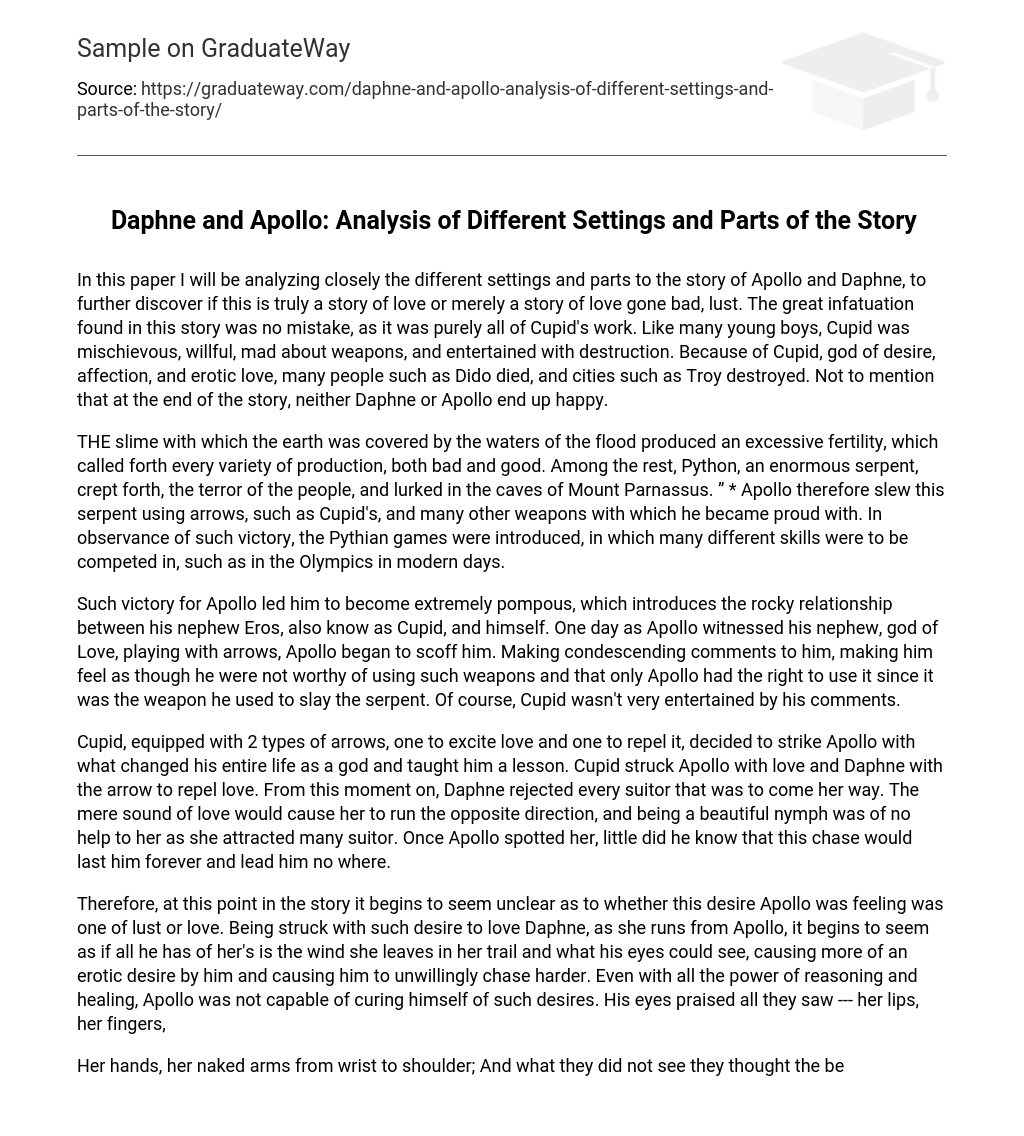In this paper I will be analyzing closely the different settings and parts to the story of Apollo and Daphne, to further discover if this is truly a story of love or merely a story of love gone bad, lust. The great infatuation found in this story was no mistake, as it was purely all of Cupid’s work. Like many young boys, Cupid was mischievous, willful, mad about weapons, and entertained with destruction. Because of Cupid, god of desire, affection, and erotic love, many people such as Dido died, and cities such as Troy destroyed. Not to mention that at the end of the story, neither Daphne or Apollo end up happy.
THE slime with which the earth was covered by the waters of the flood produced an excessive fertility, which called forth every variety of production, both bad and good. Among the rest, Python, an enormous serpent, crept forth, the terror of the people, and lurked in the caves of Mount Parnassus. ” * Apollo therefore slew this serpent using arrows, such as Cupid’s, and many other weapons with which he became proud with. In observance of such victory, the Pythian games were introduced, in which many different skills were to be competed in, such as in the Olympics in modern days.
Such victory for Apollo led him to become extremely pompous, which introduces the rocky relationship between his nephew Eros, also know as Cupid, and himself. One day as Apollo witnessed his nephew, god of Love, playing with arrows, Apollo began to scoff him. Making condescending comments to him, making him feel as though he were not worthy of using such weapons and that only Apollo had the right to use it since it was the weapon he used to slay the serpent. Of course, Cupid wasn’t very entertained by his comments.
Cupid, equipped with 2 types of arrows, one to excite love and one to repel it, decided to strike Apollo with what changed his entire life as a god and taught him a lesson. Cupid struck Apollo with love and Daphne with the arrow to repel love. From this moment on, Daphne rejected every suitor that was to come her way. The mere sound of love would cause her to run the opposite direction, and being a beautiful nymph was of no help to her as she attracted many suitor. Once Apollo spotted her, little did he know that this chase would last him forever and lead him no where.
Therefore, at this point in the story it begins to seem unclear as to whether this desire Apollo was feeling was one of lust or love. Being struck with such desire to love Daphne, as she runs from Apollo, it begins to seem as if all he has of her’s is the wind she leaves in her trail and what his eyes could see, causing more of an erotic desire by him and causing him to unwillingly chase harder. Even with all the power of reasoning and healing, Apollo was not capable of curing himself of such desires. His eyes praised all they saw — her lips, her fingers,
Her hands, her naked arms from wrist to shoulder; And what they did not see they thought the best. As Apollo tried to plea his case speaking of his greatness and all his power, she does not stop to hear a word he has to say The faster and further she ran, the more beautiful she seemed to Apollo. As the wind tore through her dress, the more beautiful he imagined her naked in the fields as she ran. He chased her as a wolf would chase a rabbit, gaining speed and becoming closer to her until he gets right behind her.
She saw waves of familiar rivers and her father’s home when she made her final request to her father. Begging her father to dress her with the earth and to take away her beauty so that no man would ever want her. At her request, her body began to take form of a tree, bark wrapped her legs as her feet became planted to the ground, her beautiful hair was made into leaves and soon after all that was left of her was a Laurel tree. In ancient Greek times, Laurel leaves were put together to make Laurel wreathes, which was a symbol of high power.
The wreathe of Laurel leaves was usually given as a prize to the victor or the Pythian games since the game was in memory of Apollo and the Laurel was his symbol. Also in Christianity it is said to represent the resurrection of Christ. At the end of the story, still under the love spell that Cupid had cast against Apollo, Apollo declares the tree his own since he never was able to have her as human. From this point on, he would use her Laurel leaves as adornment for Generals and his temples. He also decorated his harp and his quiver with these leaves.
Finally he declared that her leaves would never know decay and they shall forever be green, just as he is. It almost seems as if the transformation to the tree had ended the spelled to repel Apollo’s love. When Apollo declared her leaves to always be green and never decay, her branches bowed in acknowledgment. Although it may be impossible to know what the bow really signified, most scholars would agree that this bow was a grateful bow for it becoming a sacred symbol.
Citations:
1 Thomas Bulfinch (1855) http://www. sacred-texts. com. CHAPTER III. Apollo And Daphne- Pyramus And Thisbe- Cephalus And Procris. From http://www. sacred-texts. com/cla/bulf/bulf02. htm Christopher Minster (2009) http://suite101. com/article/apollo-and-daphne-a116968. Apollo and Daphne KU Leuven, (2012) http://ancientolympics. arts. kuleuven. be/eng/tb002en. html The Pythian games Dr. T. Ombrello – UCC Biology Department (n. d. ) http://faculty. ucc. edu/biology-ombrello/pow/laurel. htm LAUREL Angella Allen (2007) http://www. wickedblog. com/2007/09/12/laurel-leaves-symbolism-and-meaning. Laurel Leaves – Symbolism and Meaning





